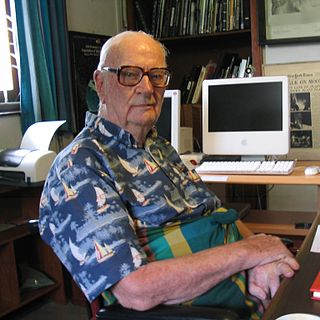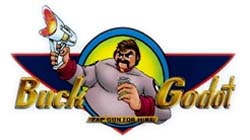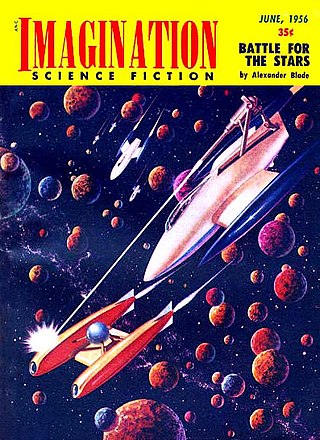
Hard science fiction is a category of science fiction characterized by concern for scientific accuracy and logic. The term was first used in print in 1957 by P. Schuyler Miller in a review of John W. Campbell's Islands of Space in the November issue of Astounding Science Fiction. The complementary term soft science fiction, formed by analogy to the popular distinction between the "hard" (natural) and "soft" (social) sciences, first appeared in the late 1970s. Though there are examples generally considered as "hard" science fiction such as Isaac Asimov's Foundation series, built on mathematical sociology, science fiction critic Gary Westfahl argues that while neither term is part of a rigorous taxonomy, they are approximate ways of characterizing stories that reviewers and commentators have found useful.

Starship Troopers is a military science fiction novel by American writer Robert A. Heinlein. Written in a few weeks in reaction to the US suspending nuclear tests, the story was first published as a two-part serial in The Magazine of Fantasy & Science Fiction as Starship Soldier, and published as a book by G. P. Putnam's Sons on November 5, 1959.

The Wasp Factory is the first novel by Scottish writer Iain Banks, published in 1984. Before the publication of The Wasp Factory, Banks had written several science fiction novels that had not been accepted for publication. Banks decided to try a more mainstream novel in the hopes that it would be more readily accepted, and wrote about a psychopathic teenager living on a remote Scottish island. According to Banks, this allowed him to treat the story as something resembling science fiction – the island could be envisaged as a planet, and Frank, the protagonist, almost as an alien. Following the success of The Wasp Factory, Banks began to write full-time.

Consider Phlebas, first published in 1987, is a space opera novel by Scottish writer Iain M. Banks. It is the first in a series of novels about an interstellar post-scarcity society called the Culture.

The State of the Art is a short story collection by Scottish writer Iain M. Banks, first published in 1989. The collection includes some stories originally published under his other byline "Iain Banks", as well as the title novella and others set in Banks's Culture fictional universe.

Look to Windward is a science fiction novel by Scottish writer Iain M. Banks, first published in 2000. It is Banks' sixth published novel to feature the Culture. The book's dedication reads: "For the Gulf War Veterans". The novel takes its title from a line in T. S. Eliot's poem The Waste Land:
Sexual themes are frequently used in science fiction or related genres. Such elements may include depictions of realistic sexual interactions in a science fictional setting, a protagonist with an alternative sexuality, a sexual encounter between a human and a fictional extraterrestrial, or exploration of the varieties of sexual experience that deviate from the conventional.

Buck Godot is the title character in a science fiction/comedy comic book series collected in two volumes and assorted comic books, including the eight-issue "Gallimaufry" series, all written and drawn by their creator, Phil Foglio.
Post-scarcity is a theoretical economic situation in which most goods can be produced in great abundance with minimal human labor needed, so that they become available to all very cheaply or even freely.

David Geddes Hartwell was an American critic, publisher, and editor of thousands of science fiction and fantasy novels. He was best known for work with Signet, Pocket, and Tor Books publishers. He was also noted as an award-winning editor of anthologies. The Encyclopedia of Science Fiction describes him as "perhaps the single most influential book editor of the past forty years in the American [science fiction] publishing world".

Dominic Flandry is a fictional character and the protagonist of the second half of American writer Poul Anderson's Technic History science fiction series. He first appeared in 1951.
Several themes recur throughout the works of American science fiction and fantasy author C. J. Cherryh.
Space warfare is a main theme and central setting of science fiction that can trace its roots back to classical times, and to the "future war" novels of the 19th century. With the modern age, directly with franchises as Star Wars and Star Trek, it is considered one of the most popular general sub-genres and themes of science fiction. An interplanetary, or more often an interstellar or intergalactic war, has become a staple plot device. Space warfare has a predominant role, it is a central theme and at the same time it is considered parent, overlapping genre of space opera and space Western.

The Space Opera Renaissance is an anthology of short science fiction that fits the definition of space opera: adventure stories of grand vision, where the majority of the action happens somewhere other than Earth. Meant to be an overview from the pulp fiction era to modern times, it is chronologically-organized and very thick but lacks representation by noted pioneers of the genre such as E. E. "Doc" Smith, Jack Vance and Alfred Bester, focusing more on the next wave. It was edited by David G. Hartwell and Kathryn Cramer. A hardcover edition was published by Tor Books in July 2006 and a trade paperback edition in July 2007.
The Culture series is a science fiction series written by Scottish author Iain M. Banks and released from 1987 until 2012. The stories centre on The Culture, a utopian, post-scarcity space society of humanoid aliens, and advanced superintelligent artificial intelligences living in artificial habitats spread across the Milky Way galaxy. The main themes of the series are the dilemmas that an idealistic, more-advanced civilization faces in dealing with smaller, less-advanced civilizations that do not share its ideals, and whose behaviour it sometimes finds barbaric. In some of the stories, action takes place mainly in non-Culture environments, and the leading characters are often on the fringes of the Culture, sometimes acting as agents of Culture in its plans to civilize the galaxy. Each novel is a self-contained story with new characters, although reference is occasionally made to the events of previous novels.
"The Game of Rat and Dragon" is a science fiction short story by American author Cordwainer Smith, written in 1954 and published in Galaxy Science Fiction in 1955. It is set in the far future, though no date is given. It occurs in the same universe as other Cordwainer Smith novels, with a passing reference to the super-powerful regulatory 'Instrumentality'.

"The Shobies' Story" is a 1990 science fiction novella by American writer Ursula K. Le Guin, describing the story of the first human crew to participate in a newly invented faster-than-light mode of space travel. It was first published in the anthology Universe 1 and subsequently appeared in A Fisherman of the Inland Sea published by Harper Prism in 1994.

Space opera is a subgenre of science fiction that emphasizes space warfare, with use of melodramatic, risk-taking space adventures, relationships, and chivalric romance. Set mainly or entirely in outer space, it features technological and social advancements in faster-than-light travel, futuristic weapons, and sophisticated technology, on a backdrop of galactic empires and interstellar wars with fictional aliens, often in fictional galaxies. The term does not refer to opera music, but instead originally referred to the melodrama, scope, and formulaic stories of operas, much as used in "horse opera", a 1930s phrase for a clichéd and formulaic Western film, and "soap opera", a melodramatic domestic drama. Space operas emerged in the 1930s and continue to be produced in literature, film, comics, television, video games and board games.
James H. Leavy was an Irish gunfighter in the Old West. He is remembered today by Western historians for participating in at least two instances of a quick draw duel. In his time, Leavy was one of the most notorious gunmen in the Old West known for challenging other gunmen to a duel. He is featured in the book Deadly Dozen, written by author Robert K. DeArment as one of the twelve most underrated gunmen of the 19th century West.











